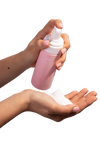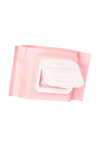
The anticipation of getting your period each month can be stressful. Everyone’s had a surprise visit from Aunt Flo once or twice! Luckily (read: unluckily) there are physical and emotional signs that many people experience to indicate that it’s that time of month again.
In fact, most people who menstruate experience premenstrual syndrome (PMS) symptoms at some point in their reproductive life. Some have more severe PMS signs and symptoms than others, so read our blog about how the menstrual cycle can impact mental health to learn when symptoms go from regular PMS to something more severe that should be managed with a healthcare professional.
Stress and other lifestyle factors, along with physical causes, can contribute to your period being more uncomfortable than usual. Before exploring the signs that show your period is coming, let’s learn the basics about menstrual cycles.
What is a menstrual cycle?
The menstrual cycle is a series of natural changes to the female reproductive system. These changes relate to hormone production along with the structures of the uterus and ovaries. The menstrual cycle occurs every month or so, with the ultimate goal of preparing the body for the possibility of pregnancy.
The length of your menstrual cycle is calculated from the first day of your period to the day before your next period starts. Most people will see their period recur every 28 days. However, cycles of 21 to 35 days are also normal. If the frequency of your period or length of your cycle is bothering you, speak to your doctor.
The menstrual cycle is made up of four stages - your period, follicular phase, ovulatory phase, and luteal phase. Think of these as seasons your body goes through, from Winter to Summer - from low energy and time for rest on your period, to increased energy and feeling your best self during ovulation.
What is PMS?
Premenstrual syndrome (PMS) is very common. PMS is a combination of symptoms that many people get about a week or two before their period (AKA in the luteal phase of the cycle). These symptoms are good indicators that your period is on its way.
Knowing the signs your period is coming and what exacerbates your symptoms can help you handle your menstrual symptoms better. For example, a lack of sleep or drinking too much coffee may intensify PMS symptoms. Recognizing these period symptoms can help you mentally and physically prepare for your next period. It can also allow you to listen to your body and invest time in self-care. After all, that’s what the luteal phase is all about - slowing down!
Most people typically start noticing physical and mood changes about 1-2 weeks before the period starts, and period signs and symptoms usually end about 3-4 days after bleeding begins.
Let’s take a look at the common signs of PMS, which can be a clear indicator that your period is about to arrive.
Signs your period is coming
1. Skin is breaking out
You may start breaking out on your jawline, chin, or anywhere on your face. It is also common to experience breakouts on your back (sweet, sweet bacne). Acne is a fairly standard symptom to have before or during your period, and is caused by the natural hormonal changes associated with the reproductive cycle.
Period-related blemishes are called cyclical acne. Rising hormone levels increase oil production, which leaves pores clogged with oil, dirt, and dead skin cells, resulting in pimples as your period is about to start.
2. Tender breasts
Another common symptom is sore or heavy breasts. Breasts can feel achy and swollen due to fluctuating hormone levels. If you’ve ever wondered why your premenstrual boobs are bigger than normal, your breast ducts may be larger due to higher oestrogen levels, and progesterone can make your milk glands swell.
The soreness and heaviness can make your breasts feel very sensitive. Breast tenderness before your period is common, but if you have other concerns about your breasts or notice anything out of the ordinary, you should see your healthcare professional.
3. Menstrual cramps
Looking for signs your period is coming tomorrow? Menstrual cramps are a pretty good indicator. Cramps in the lower abdomen and lower back are very common, as are aches and cramps in your thighs.
But there’s good news! You don’t have to be stuck with this pain. VUSH’s Aura Period Pain Relief Device is an effective way to pause period pain without painkillers. Aura sends out good vibrations in the form of electro currents to help manage your cramps, so you can go from the foetal position back to your vibrant self in no time.
Certain health conditions can make cramps more severe. Those include endometriosis, cervical stenosis, adenomyosis, pelvic inflammatory disease, fibroids, and more. If your cramps are unmanageable on your own or cause you concern, seek advice from your health professional.
4. Mood swings
The emotional symptoms of PMS can sometimes be more severe than the physical ones. You may experience mood swings, feel angry, irritable, anxious, and even be a hot crying mess - these are all feelings associated with PMS.
Mood swings can feel like an emotional rollercoaster. It’s common for heightened emotions to be followed by the onset of your period. Your changing oestrogen and progesterone levels are to blame.
5. Feeling bloated
Changes in oestrogen and progesterone levels can cause your body to retain more water and salt than usual. That results in a bloated feeling. Despite being hormonal, you may be able to reduce some premenstrual bloat by limiting salt, eating fruits and veggies, and engaging in regular exercise.
Many people get relief from this symptom two to three days after their period starts. Often the most significant bloating occurs on the day that bleeding begins.
6. Feeling tired
As your period approaches, and you start experiencing symptoms of PMS, your oestrogen levels peak and then fall quickly – causing you to feel tired or sluggish. This shift in hormone levels (and mood changes) can cause fatigue.
Changes in oestrogen and progesterone can also result in your core body temperature increasing, especially during sleep. You’re more likely to get good rest when your core body temperature decreases. So, if you struggle to sleep before or during your period, now you know why.
How to prepare for your period & manage PMS
Recognising the signs that your period is coming helps you prepare to deal with the symptoms your body goes through during your menstrual cycle.
Here are a few things to keep in mind when your period is due:
1. Monitor your emotions
Recognise if you’re feeling unusually emotional so that you can manage intensified reactions. Show some self compassion now that you know there are hormonal explanations for these feelings and you’re not being irrational.
2. Exercise
Don’t worry, no strenuous activity needed. A gentle walk or a yoga class can help increase endorphins, feel physically strong, and release stress in a time of vulnerability.
3. Eat more frequent meals
Give yourself permission to eat more throughout the day. Eating smaller but more frequent meals can reduce bloating and the sensation of fullness and lethargy.
4. Choose anti-inflammatory foods
Anti-inflammatory foods can include salmon and berries, or vitamin C from lemons and oranges. Go for magnesium rich foods such as greens, beans, and grains. Ensure your diet is full of fruits and veggies, omega-3 fatty acids, lean proteins, wholegrains, and high-fibre foods.
5. Drink water, minimise caffeine and alcohol
Your PMS-friendly diet choices can also be supported by avoiding certain drinks. Caffeine and alcohol increase blood pressure and resting heart rate, which can heighten anxiety and stress. Opt for herbal teas and water instead! Drinking enough water will minimise constipation, decrease bloating, and keep you hydrated while you’re losing fluids and retaining water.
6. Take care of yourself
Like we hope you would on your period, up your self-care game during the luteal phase when you’re experiencing PMS. It’s okay to slow down and rest, even when your period hasn’t arrived yet. Tune in to your body and give it the care it deserves.
Read more on VUSH Wellness:
Remember, only you know what feels normal. Trust yourself when your body is displaying signs of stress and unusual pain. Don’t let anyone tell you that extreme premenstrual pain is normal! If you’re concerned, contact your health professional.
Discover more of our wellness articles such as 8 steps to surviving your period. Read up on how to relieve endometriosis pain or why you should invest in a TENS device to learn more about relieving muscle and period pain.









 AUD $
AUD $
Leave a comment (all fields required)